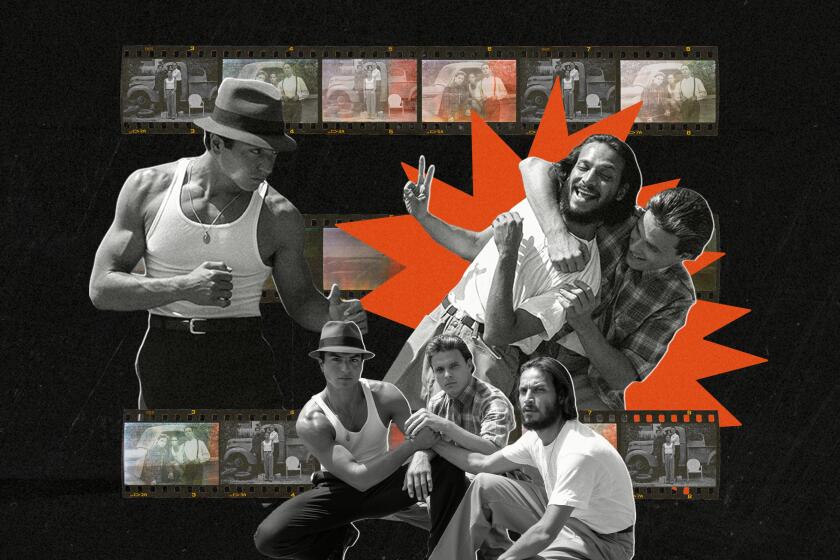The self-confidence man
Arnold SCHWARZENEGGER never wanted to be an actor. He says so on Page 128 of “Fantastic,” Laurence Leamer’s dully dutiful biography. He wanted to be rich. He wanted to be famous. He wanted to be powerful. He thought he could grope women with impunity, Leamer says. He wanted, in short, to be a star, a role in which acting is an option but does not need to be wholeheartedly embraced. So, he mobilized his relentless ambition, his indefatigable energy and a certain boyish good nature -- it is easy to be appalled by Schwarzenegger, but it is hard to completely dislike him -- and became the creature of his dreams and the stuff of less boldly narcissistic people’s nightmares.
In the meta-myth (or campaign biography) version of this story, his is a typical immigrant’s tale. Leamer describes him as a poor and feckless youth from provincial Austria, the son of an abusive father and a subservient mother. Schwarzenegger and the other village louts got to fooling around with some primitive bodybuilding equipment and he discovered he had a talent for the sport. Oh, wait a minute, there are two misapplied words in that sentence. Bodybuilding does not require talent -- it requires the dogged discipline to work out many grunting hours per day and, for some, the willingness to imbibe dangerous amounts of steroids -- and it is not a sport. You become Mr. Olympia (a title Schwarzenegger attained seven times) by striking grotesque, nearly nude poses that stress the strong points of your physique while minimizing its weaknesses. Schwarzenegger was good at that, a master of sly competitive gamesmanship, and he soon left Europe for America, where, sponsored by various vaguely unsavory characters who sensed something special in him, Leamer writes, he almost immediately prospered.
In 1977, he starred in the documentary “Pumping Iron,” which stressed his likable oafishness as he pursued the highest levels of a low-level activity. He was similarly agreeable in Bob Rafelson’s 1976 fictional film “Stay Hungry,” and then, in 1984, James Cameron rewrote “The Terminator” (arguably a great film and certainly the best one Schwarzenegger ever appeared in) to stress the (symbolically) mechanized and implacable menace the director perceived in the man.
Soon he was a superstar, by which I mean that his fame and prosperity were no longer entirely dependent on the pictures he made or the roles he played. He was now simply “Arnold!” achieving in the 1980s and 1990s that “apex of human endeavor,” as Gary Indiana ironically calls it in “Schwarzenegger Syndrome” -- pure and transcendent celebrity. With eerily serene self-confidence he could poke his nose in anywhere -- including politics, naturally -- and be respected.
Some of Schwarzenegger’s instincts were not bad. For example, he quite perfectly judged the moment when to start playing off his muscular image, something all the great male action stars have to do, and he was funny in comedies like “Twins” and “Kindergarten Cop.”
Leamer devotes something like a third of his book to Schwarzenegger’s bodybuilding years, and these desperately humorless pages will send any reasonably sentient reader into the streets, barking like a dog. But they are the most instructive passages in his book. Bulking up prettily is a solipsistic act requiring its devotees to peer endlessly into mirrors, studying the effect minuscule changes in their musculature may have on the judging eye. This is self-involvement of a special sort, demanding shrewdness about how the image glimpsed in the glass will appear to others but none of the intelligence (or “interiority” as Indiana calls it, one of his few clunky terms) that other narcissistic activities, like acting or writing, impose on their practitioners. Here, appearance is everything, and whatever may be going on beneath the body mass -- if anything -- is unimportant.
Question: Does bodybuilding wipe the mind clean of all but this capacity for self-regard? That question, however, doesn’t really matter. I think we can join Leamer in believing that Schwarzenegger’s style of self-presentation derives almost entirely from the years he spent studying his own exteriority and its effect on others. He was, Leamer says, “all about control,” which came out of the intense self-discipline of his bodybuilding years. His habit, whether he was involving himself in a movie or in a gubernatorial race, was to blow into meetings, full of good cheer and bad jokes, but with his agenda unwaveringly set. Whatever was going on, it was always about his presentation to the groveling masses. Leamer quotes one of Schwarzenegger’s political operatives thus: “Reagan felt the power of ideas. And Arnold felt the power of himself.”
When Schwarzenegger turned to politics, his views on topics like abortion were quite liberal: You might credit his wife, Maria Shriver, for his moderation. Or perhaps his recollections of the genial hedonism of his formative Muscle Beach years. But to be honest, he seemed to me -- if not to my more politically correct friends -- the only plausible candidate in the recall election two years ago. Maybe he was only literally, not metaphorically, a giant among the rest, but I mean, come on -- Cruz Bustamante?
Leamer, who does his best to disguise his fundamental liking for his subject behind a veil of objectivity, treats Schwarzenegger’s politics earnestly: He does at least suggest that they are a newish form of the game, with image trumping issues every time. But his chapters on Schwarzenegger’s gubernatorial race fully match his numbing work on his bodybuilding years.
For fun, insight and full-body-press contempt, there is Indiana’s little book. It is scarcely more than a pamphlet, but at least it’s not flat reportage. It’s a work of social criticism, and, at that, not entirely negative about Schwarzenegger. Indiana is rather good, in fact, at reading Schwarzenegger’s movies critically (something Leamer, in thrall as he is to grosses and gossip, doesn’t bother with), showing how they were, in effect, campaign promises for some political race Schwarzenegger could for many years only vaguely imagine. All he knew, in Indiana’s account, was that the narcissistic logic of his character demanded such a conclusion.
In essence, Indiana -- an H.L. Mencken for our times -- sees Schwarzenegger as a lucky stiff. Image politics is scarcely a new American phenomenon, and Indiana’s most poisonous shafts are directed not at Schwarzenegger but at an electorate so addled by celebrity that it is no longer capable of even the simplest attempts at democratic rationalism. Still, two years ago, California -- financially troubled, reeling from the energy crisis, governed by dreary time servers -- required, well, yes, a Terminator. And here he was -- driven, energetic, beaming contemptuous wisecracks at his opponents -- a figure whom everyone was used to seeing blow away the bad guys.
No one cared about anything else. They didn’t care when the media dug up some ambiguously kind words he had once uttered about Hitler, didn’t care when this newspaper printed accusations of past sexual harassment. (As a matter of dismal fact, those stories probably enhanced his appeal among envious males, for they indicated that nothing was beyond the power of his stardom.)
Office-holding has bound our Prometheus in the toils of mediocre political convention, his popularity, according to the polls, is slipping, and his way to the presidency is blocked by the constitutional ban on foreign-born citizens holding that office.
One senses a personal tragedy gathering around Schwarzenegger now. There are no goals left to him that are worthy of his titanic self-regard. As for the electorate, their attention spans already shrunken to gnat-like dimensions, they’ll have to find another circus act to distract themselves with. You can call that a tragedy, if you like (the death of meaningful democracy), but you will perhaps more comfortably live with it, if you see it as Indiana does -- as an endless and incurably hilarious farce. *
More to Read
Only good movies
Get the Indie Focus newsletter, Mark Olsen's weekly guide to the world of cinema.
You may occasionally receive promotional content from the Los Angeles Times.






